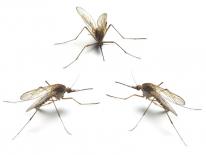
West Nile virus (WNV) is a disease most commonly spread to people or animals by mosquito bites. The first human case of WNV was reported in the District of Columbia (DC) in 2002, and has been found in DC ever since.
Most people infected with WNV do not get symptoms. About 1 in 5 people who are bitten by a mosquito carrying WNV will develop a fever and other symptoms such as a headache, body aches, joint pains, vomiting, diarrhea, or a rash, 2 to 14 days after being bitten by an infected mosquito. Sometimes the symptoms can last for weeks or months. Unfortunately, about 1 out of 150 people bitten by a mosquito carrying WNV develop a serious, sometimes fatal, illness. This can happen in people of all ages. However, people over 60 years of age and those with certain medical conditions, such as cancer, diabetes, hypertension, kidney disease, and people who have received organ transplants, are at greater risk. There is no treatment or vaccine for WNV, so the best way to prevent getting sick is to prevent mosquito bites.
In DC, cases of WNV occur during mosquito season, which starts in the summer and continues through fall. The good news is there are steps you can take to prevent mosquito bites. To learn how to avoid mosquito bites and how to stop mosquitoes from living near your home visit DC Health’s Mosquito-Borne Diseases webpage.
DC Health West Nile Virus Surveillance Results
Since 1999, when WNV first came to the United States, the District of Columbia Department of Health (DC Health) has been recording the total number of DC residents that became sick with WNV every year. You can view the total number of people that became ill with WNV in DC, and the rest of the US, below. The numbers are updated monthly starting in 2018.
Additional national statistics, including maps, can be found on the Centers for Disease Control and Prevention’s (CDC) website.
Every summer mosquitoes in DC are trapped and tested to see if they are carrying WNV. In DC, the common house mosquito (Culex pipiens) is the most likely type of mosquito to carry WNV, but the Asian tiger mosquito (Aedes albopictus) can also carry it. Weekly lists of where mosquitoes carrying WNV were found can be viewed on DC Health’s Mosquito-Borne Diseases webpage.
Information for Human Healthcare Providers
Reporting West Nile virus in people
All cases of WNV in a person should be reported using DC Reporting and Surveillance Center (DCRC), our online reporting system.
►Submit a Notifiable Disease and Condition Case Report Form using DCRC
Diagnosis
- Laboratory diagnosis is made by testing serum or cerebrospinal fluid (CSF) to detect WNV-specific IgM antibodies. Immunoassays for WNV-specific IgM are available commercially. When interpreting WNV test results, please consider the limitations of serologic testing. These limitations are covered in more detail in the August 6, 2018, Health Notice titled: West Nile virus updates.
- When testing for any mosquito-borne disease, first line testing should be performed at your facility or a commercial laboratory, depending on your facility’s capabilities. Confirmatory testing only is available through the Centers for Disease Control and Prevention (CDC) and must be first approved by DC Health. To request confirmatory testing for any mosquito-borne disease through the DC Public Health Laboratory submit a Notifiable Disease and Condition Case Report Form using DCRC and select “Yes” when asked: “Are you requesting Public Health Laboratory clinical test.”
Treatment
When treating patients for WNV, keep in mind that most mosquito-borne diseases present the same clinically, should be managed with supportive care, and can only be differentiated with diagnostic testing.
The following guide lists common clinical features of some mosquito-borne diseases: Mosquito-Borne Disease Clinical Comparisons.
Resources
- CDC: WNV in pregnancy and breastfeeding
- CDC: Guidelines for the evaluation of fetal and neonatal WNV infections
- CDC: Diagnostic Testing
Information for Animal Healthcare Providers
Reporting West Nile virus in animals
All cases of confirmed WNV in an animal should be reported using DC Reporting and Surveillance Center (DCRC), our online reporting system.
►Submit a West Nile virus report for an animal using DCRC
Resources
- The Center for Food Security and Public Health: West Nile virus
- Overview of Equine Arboviral Encephalomyelitis (Merck Veterinary Manual)
- Overview of West Nile Virus Infection in Poultry (Merck Veterinary Manual)
DC Health Contact Information
For more information on West Nile virus call (202) 442-5865 or email [email protected].


